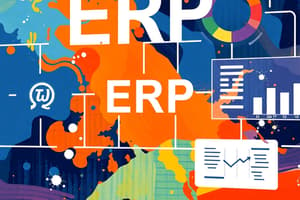Podcast
Questions and Answers
What is the significance of efficient business processes?
What is the significance of efficient business processes?
- They can become liabilities for the organization.
- They can be considered assets to the business. (correct)
- They require less coordination between departments.
- They streamline activities but have no impact on performance.
Which of the following best describes the role of Transaction Processing Systems (TPS)?
Which of the following best describes the role of Transaction Processing Systems (TPS)?
- They handle and record all routine transactions necessary for operations. (correct)
- They serve top-level executives to strategize future plans.
- They provide complex analysis for long-term business predictions.
- They connect various departments for collaborative projects.
What are enterprise applications primarily designed to do?
What are enterprise applications primarily designed to do?
- Encourage competition between departments.
- Focus exclusively on financial transactions.
- Enhance individual employee performance metrics.
- Support various business processes and management levels. (correct)
Which functional area would likely handle the step of assembling a product?
Which functional area would likely handle the step of assembling a product?
How do business processes generally function within an organization?
How do business processes generally function within an organization?
What is typically NOT a function of the Order Fulfillment Process?
What is typically NOT a function of the Order Fulfillment Process?
What type of management typically relies on Transaction Processing Systems?
What type of management typically relies on Transaction Processing Systems?
What is the main goal of a Transaction Processing System (TPS) for payroll processing?
What is the main goal of a Transaction Processing System (TPS) for payroll processing?
What is the primary function of intranets in a business environment?
What is the primary function of intranets in a business environment?
Which of the following best describes Business Intelligence (BI) systems?
Which of the following best describes Business Intelligence (BI) systems?
What is the main goal of Supply Chain Management (SCM) systems?
What is the main goal of Supply Chain Management (SCM) systems?
What type of system provides regular reports for decision-making in a business?
What type of system provides regular reports for decision-making in a business?
Which of the following is NOT a function of Customer Relationship Management (CRM) systems?
Which of the following is NOT a function of Customer Relationship Management (CRM) systems?
Which of the following is a feature of Decision Support Systems (DSS)?
Which of the following is a feature of Decision Support Systems (DSS)?
What advantage do Enterprise systems provide to companies?
What advantage do Enterprise systems provide to companies?
What is a key advantage of using e-business for communication?
What is a key advantage of using e-business for communication?
How do Management Information Systems (MIS) primarily serve middle management?
How do Management Information Systems (MIS) primarily serve middle management?
Which system is primarily focused on collecting and sharing company knowledge?
Which system is primarily focused on collecting and sharing company knowledge?
E-business encompasses which of the following?
E-business encompasses which of the following?
What is the primary focus of model-driven Decision Support Systems (DSS)?
What is the primary focus of model-driven Decision Support Systems (DSS)?
Which of the following is not a function of Business Intelligence systems?
Which of the following is not a function of Business Intelligence systems?
What is a key outcome of using Knowledge Management Systems (KMS)?
What is a key outcome of using Knowledge Management Systems (KMS)?
How do Supply Chain Management systems improve efficiency?
How do Supply Chain Management systems improve efficiency?
Which statement best describes E-commerce?
Which statement best describes E-commerce?
What is the primary purpose of Executive Support Systems (ESS)?
What is the primary purpose of Executive Support Systems (ESS)?
Which role is primarily responsible for overseeing IT strategy in a company?
Which role is primarily responsible for overseeing IT strategy in a company?
How do Data-driven Decision Support Systems (DSS) assist managers?
How do Data-driven Decision Support Systems (DSS) assist managers?
What is a key function of the Information Systems Department?
What is a key function of the Information Systems Department?
What aspect does IT Governance focus on within an organization?
What aspect does IT Governance focus on within an organization?
What is a direct benefit of Hyperion to a CEO?
What is a direct benefit of Hyperion to a CEO?
Which Chief Officer is concerned mainly with data privacy and compliance?
Which Chief Officer is concerned mainly with data privacy and compliance?
What type of data does a digital dashboard typically display for senior management?
What type of data does a digital dashboard typically display for senior management?
Study Notes
Business Processes and Information Systems
- Business processes involve the flow of materials, information, and knowledge.
- Can be functional (specific to one area) or cross-functional (spanning multiple areas).
- Efficient processes are valuable, whereas inefficient ones can be liabilities.
Types of Business Processes
- Manufacturing and Production: Assembling a product
- Sales and Marketing: Identifying customers
- Finance and Accounting: Creating financial statements
- Human Resources: Hiring employees
The Order Fulfillment Process
- Sales: Receives the order and processes it.
- Accounting: Ensures payment is processed and recorded.
- Manufacturing: Assembles and ships the product to the customer.
Types of Information Systems
-
Transaction Processing Systems (TPS): Handle routine, structured tasks.
- Focus on predefined goals and decision-making.
- Examples: Sales order entry, payroll, shipping.
- Provide managers with operational status and external relations insights.
-
Enterprise Applications: Connect different parts of a company.
- Support various business processes and management levels.
Enterprise Applications
-
Enterprise Systems: Manage core business activities.
- Integrate data from various departments into a central location.
- Help with coordinating activities, responding to customer orders, and improving decision-making.
-
Supply Chain Management (SCM): Manage relationships with suppliers.
- Share information like orders, production, inventory, and deliveries.
- Goal is to ensure the right products reach their destination efficiently and cost-effectively.
-
Customer Relationship Management (CRM): Manage interactions with customers.
- Streamline processes related to sales, marketing, and customer service.
- Identify, attract, and retain profitable customers.
-
Knowledge Management Systems (KMS): Capture and share company knowledge.
- Support product creation and delivery, knowledge collection and sharing, and access to external expertise.
E-business and E-commerce
- E-business: Using digital technology and the internet to manage and improve business processes.
- E-commerce: A part of e-business that focuses on buying and selling goods and services online.
Intranets and Extranets
- Intranets: Internal company websites accessible only to employees.
- Extranets: Company websites accessible by external partners like vendors.
How IT Improves Business Processes
- Efficiency: Automating tasks that were previously done manually.
- New Processes: Changes how information flows, enables parallel tasks, reduces decision delays, and supports new business models.
Business Intelligence
- Tools and data to help managers and users make better decisions.
Management Information Systems (MIS)
- Provide regular reports for decision-making.
- Utilize data from Transaction Processing Systems (TPS).
- Focus on generating reports rather than deep analysis.
Decision Support Systems (DSS)
- Support non-routine decision-making.
- Utilize both external information and data from TPS & MIS.
- Types: Model-driven DSS (complex calculations) and Data-driven DSS (large data analysis).
Executive Support Systems (ESS)
- Assist senior management with strategic decisions.
- Utilize data about external events and summarized information from MIS & DSS.
- Examples: Digital dashboards for financial performance.
Information Systems Department
- Manages the company's technology services.
Key Roles in the Information Systems Department
- Chief Information Officer (CIO): Leads the department and oversees IT strategy.
- Chief Security Officer (CSO): Focuses on IT security.
- Chief Knowledge Officer (CKO): Manages the company's knowledge resources.
- Chief Privacy Officer (CPO): Ensures data privacy and compliance.
- Programmers: Write and maintain software code.
- Systems Analysts: Design solutions for business problems.
- Information Systems Managers: Oversee IT teams and daily operations.
IT Governance
- Creates strategies and policies for how IT is used within the organization.
- Defines decision rights and accountability for IT-related decisions.
- Organizes the information systems function, which can be centralized or decentralized.
End Users
- Representatives from other departments who use the applications developed for them.
- Increasing role in system design and development to ensure technology meets their needs.
Studying That Suits You
Use AI to generate personalized quizzes and flashcards to suit your learning preferences.
Related Documents
Description
This quiz explores the fundamentals of business processes and the role of information systems in various functions. It covers types of business processes such as manufacturing, sales, and finance, highlighting the importance of efficiency. Additionally, it delves into transaction processing systems and their applications.




